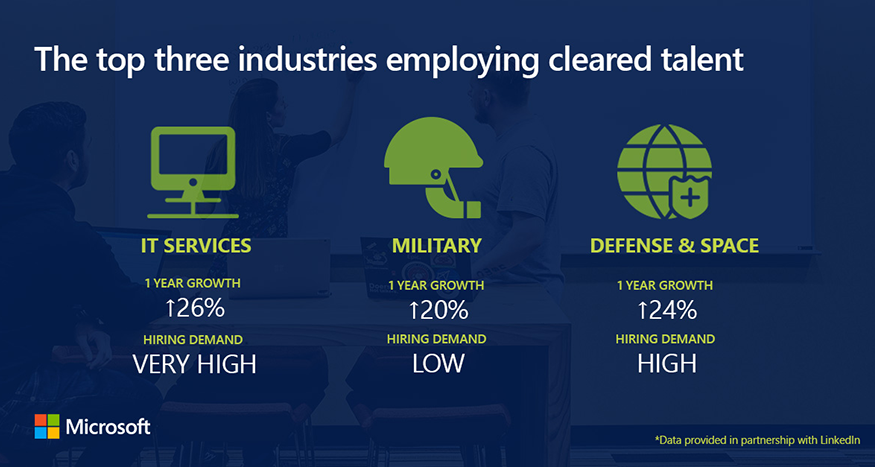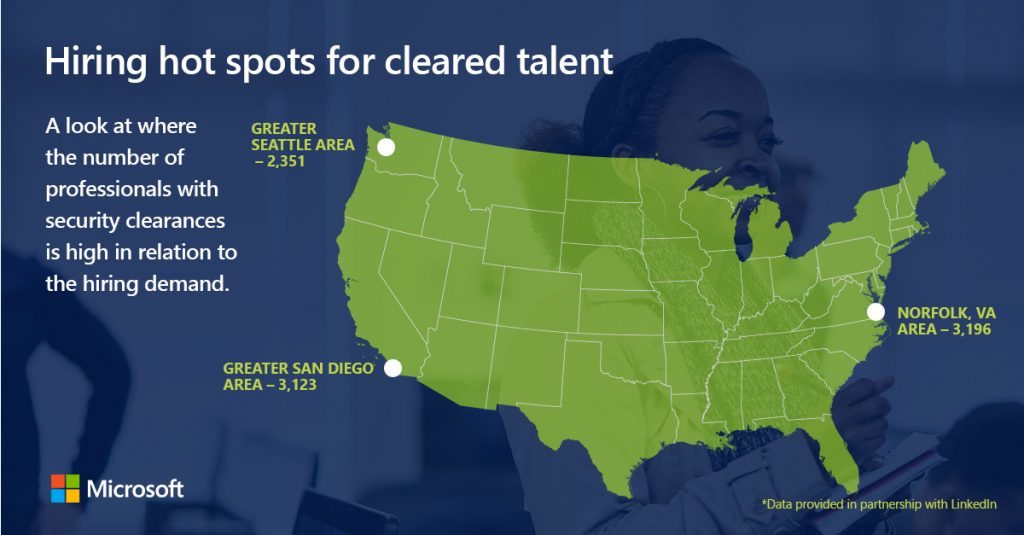Meeting the demand for cleared veteran talent
This post was originally published on LinkedIn and written by U.S. Marine Corps Major General (Ret.) Chris Cortez, vice president of Microsoft Military Affairs, on November 15, 2018.

Today the United States government faces an unprecedented range of threats—from both traditional foes to modern menaces in the digital realm. And as our country faces these new challenges, it is also in the midst of a digital transformation of its services and operations. Equipping people on the front lines of national security with modern skills and technological awareness is paramount, and we’re committed as industry partners to helping along that journey.
Yet, the work of modernizing and protecting the US government is not just a technology story, it is a people story. Our ability to safeguard our people and institutions relies on a highly specialized and skilled workforce to build, code, and innovate for the future. What we’re seeing now though is a gap between the demand for capabilities and the supply of this much-needed talent.
Many of us have heard about the technology skills gap. We know that technology jobs are growing at a faster rate than the average for all other occupations, and that the demand greatly outpaces the supply. The Brookings Institution suggested last year that digitization of the US economy will require significant investment in education and training both to broaden the pipeline of talent and also to ensure that underrepresented groups aren’t left behind in the new digital economy.
In government though, there is an even more specific gap—that of “cleared talent”—those with security clearances that can be applied to tackle problems that require access to highly sensitive information. And within this pool of talent, there is a very small population of cleared talent with the background in technology that is required to help our government modernize at levels needed. Despite the need to expand this workforce, we’ve seen the population of cleared talent decrease by 30 percent since 2013, with wait times for security clearance approvals now at their highest level ever. Last year, the US was sitting on a security clearance backlog of more than 700,000 applicants.
New data we obtained in partnership with LinkedIn shows the demand for cleared software engineers is very high—with the Washington, D.C., area as the highest demand in the country—and that only 5 percent of professionals with a security clearance hold a degree in computer science. The top two industries hiring cleared talent are also expected to grow even more in the next year: The defense and space industry by 53 percent, and the information technology industry by 49 percent.
The stunted pipeline for cleared talent is not just an HR problem. It is a matter of national security and a threat to progress and innovation.
One population that is critical to help close this gap is our country’s talented veteran workforce. We know that 200,000 military members transition out of the service every year, and, of those with security clearances, many are active duty military, according to a 2018 ClearanceJobs.com report.
At Microsoft, we pioneered Microsoft Software & Systems Academy (MSSA), which trains transitioning service members and veterans over the course of an 18-week program for careers in the IT industry. Since MSSA started five years ago, nearly 400 companies and organizations have hired our graduates. For us, it’s proof not only that veterans are an incredible talent pool, but that programs like MSSA are essential to addressing critical skills gaps in the tech industry outside the traditional four-year degree. Companies like Microsoft are better for having these phenomenal veterans working for us and helping advance our mission.
That’s why I am excited to announce that Microsoft will launch a new, dedicated MSSA-cleared talent cohort at Washington state’s Joint Base Lewis-McChord this spring. The program will cater to service members and veterans with active clearances who are interested in learning cloud application development, which is in high demand in the technology industry. As with every MSSA cohort, these students will be mentored by current Microsoft employees and upon completion of the course will be guaranteed an interview with Microsoft or one of our hiring partners, including the US government.

National security depends on private and public institutions working together to prevent and address emerging threats. And being a trusted partner for government transformation means that we are just as committed to investing in our own talent pipeline as we are in theirs. Innovative training programs like MSSA, which benefit both veterans and the industry as a whole, are critical.
There is much more that can be done to address both the technology skills gap and the cleared talent gap, but we must seek new and innovative ways to both build our pipeline of workers and support those who are being left out of the digital economy. Empowering active duty service members and veterans to transition to careers in technology is a win-win for helping to sustain a vital population of our workforce while building a critical, diverse pipeline for in-demand talent. By prioritizing IT and technology training for veterans to operate in the private sector, we can transform our collective capabilities to keep our country safe and moving forward.
Visit military.microsoft.com/MSSA to learn more.
